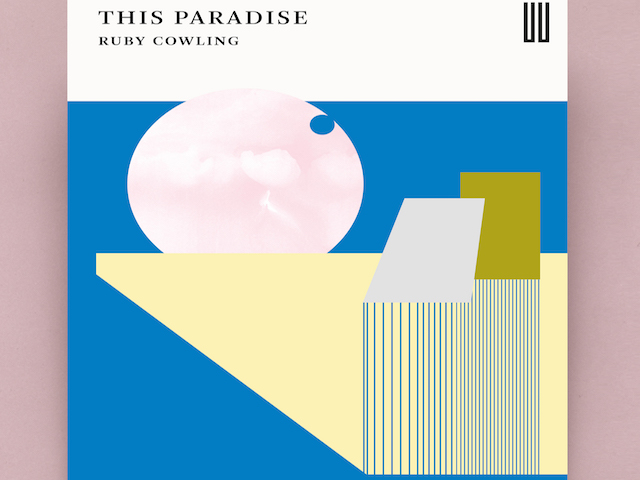James Young interviews Ruby Cowling about her collection This Paradise published by Boiler House Press, and currently longlisted for the Orwell Prize for Political Fiction.
With This Paradise being longlisted for the Orwell Prize for Political Fiction, perhaps a good place to start is to talk about writing the political. To what extent do you see the book as political writing?
I’ve been surprised by the extent to which it has been received as political writing, because it’s not something I consciously set out to do. I would never have thought it was a political book until the first few reviews started picking up on the wider issues, and to situate some of the stories in a bigger context, which I then realised I was writing about…it’s funny how when a book comes out and the reviews appear you begin to see your work in a different way, and you keep learning about what it was you were doing that you’d never realised.
My mindset, because of the way I was brought up, which was during the Thatcher years, and other things, tends to be to see things in what might be called a political or bigger context…I just enjoy thinking about systems, and the way things fit together, much more than a story about a couple having a bad time in their marriage, a very enclosed sort of story. I like things which refer outwardly to more elements that act on each other, if I can put it that way. It makes it more interesting to me if I can see a lot more moving parts happening, and also it helps keep a story going. There are lots more influences on the characters, more pushes and pulls on them, other than the purely psychological ones.
I’m not interested in writing any kind of polemic or journalism, though. I don’t know how anyone has surety about anything, I don’t know how people know all the time whether things are good or bad. But I am interested in thinking about the questions. So I just end up with humans in difficult situations, which probably then get more difficult. That just seems to reflect how I experience life and how I see other people around me experiencing life.
Many of your stories could be seen as dystopian or speculative. Yet you constantly root us in our present reality, by referring to things like Asda or Pizza Express or Flamingo Land (a theme park in Yorkshire and the title of one story). I wondered how intentional that connection was, and how you saw the relationship between the world of your stories and our world today?
I’d call it more of an alternative present than a dystopian future. I think it just pleases me more if you can imagine if this tiny element of our world was different now, rather than “what if we end up in this particular place”.
It’s not just a time marker, it can be a regional marker, like with Flamingo Land, or a class marker. So Asda would be somewhere you might shop if you’re in the north, but it’s not one of the top supermarkets, it’s not as if the character went to Fortnum and Mason to get their groceries. So it can be shorthand for other aspects as well as saying this is now, this is Britain.
There’s also an element of bringing in the banal elements of the real world, like Asda, in order to democratise the story. It brings you an easy win in terms of making it believable, I think, rather than have to make up a brand of supermarkets or constantly having to invent a real world. You just bring the reader in more easily, especially when you’re introducing speculative elements that don’t exist in this world. It’s good to have markers where there’s something to hang on to, some reassurance for the reader.
Without being glib or facetious, it arguably feels that we’re living through our own form of dystopia at the moment, with words like lockdown and social distancing now normal and commonplace. Do you feel like you want to, or can, write about the current situation? Or do you need some space, some historical perspective, before you can think about it?
I think I do because I’m a slow writer and a slow thinker. I tend to get really sparked by things that are happening in the now, but finding a non-cheesy angle on things takes me a long time…I’m asking myself every day whether I want to be writing about this stuff, and in a way, yes, because it’s right up my street, and I really desperately need to get into the world of creating something, but on the other hand I’m quite nervous about reading other people’s Covid stories and poetry. I just don’t want to see it right now, like I don’t want to see my own attempts right now.
The thing I’m beginning to work on began with an image of something completely unrelated, and then taking that into a story…it’s certainly being influenced by where we are now, but there’s going to be no reference to lockdown or the virus or anything, just because it feels crass to do that now. I’m sure other, better writers will be able to do that now and do it brilliantly, which is great, but I don’t think I can and I don’t want to be them. It would just feel like kind of trying to cannibalise my current life, even as I’m living it, like eating your own tail, somehow. I’m not really interested in just adding to the noise.
Technology is often associated with a sense of threat or disconnection in This Paradise. I wonder could you maybe say a little about that, given we’re probably scaling new heights of disassociation at the moment. Many of us are living almost entirely virtual or screen-based lives, yet at the same time, despite our physical separation, we can connect with each other more easily than ever before. Is our relationship with technology inevitably ambiguous and conflicting?
Again I’m at the level of being interested in the question, I don’t really come down on one side of the fence or the other, because probably like everyone else I feel ambivalent about it. I’m absolutely dependent on it, God knows now more than ever, and I think it’s fantastic and exciting and interesting and I geek out over various new things, and even old things. And yet I’m really interested in how it’s changed us socially and the way we relate to ourselves as animals, as physical beings.
That’s an eternal question I’m going to be interested in, even more so right now, when we’re having to face the reality of ourselves as animals, as vulnerable organisms, in a way that perhaps we haven’t had to in a long time. I think that technology and the ubiquity of technology use is one of the reasons why we’ve lost the sense of ourselves as animals, so that’s an area I’m really interested in, the dynamics of it and the ways in which we’re changing.
I suppose it always comes over as though it’s a shame, it’s brought bad things, we’re losing something. And I do think that, especially as it means we’re losing touch with the natural world, and losing sight of the importance of the fact that we’re just another part of it. I think the more we have technology and the more we rely on it, the more we feel we’re exceptional and superior, and the knock on effect of that is we stop caring about the environment and just let the world go to hell. So that’s the danger, I think. But on the other hand isn’t it absolutely incredible that tonight I might decide to Skype with my sister in Minnesota, who otherwise I wouldn’t have seen for over a year. God knows how it would be if we didn’t have that technology.
That leads to another potential contradiction; your writing manages to be both human, with this great emotional heart to many of the stories, but at the same time often structurally innovative, like in stories like The Two Body Problem, where the narratives of twins run concurrently down either side of the page, and The Ground Is Considerably Distorted, which features tweets and news bulletins in the margins. I wondered how you saw the balance between the two, and which comes first when you’re writing stories like that?
There’s two really separate answers for those two specific stories. For The Ground Is Considerably Distorted the story really dictated the form because I knew I wanted several different equally important narrators and I also wanted to have a lot of media noise going on in the story, as though it’s literally going on around us, in our heads. So I had to find a way of not having the page, and the turning of the page dictate what happened when, and I knew I was going to have to have certain different things happening on the page at the same time.
The Two Body Problem was kind of form first. There was a call out for an anthology called I Am Because You Are to celebrate the 100th anniversary of Einstein’s discovery of the Theory of Relativity…and I had an idea about twins and relativity and bodies acting on each other, physical bodies in space. The idea that every object has a gravitational force, no matter how small, and forces of attraction and repulsion against other bodies…I’m a twin, so I had something to work out around twinning and being a twin and moving through life, and the way we affect each other, especially as my sister is a great distance from me now. Though nothing in the story is autobiographical, the drive to write it did have a personal basis. The idea is that in a binary star system, two planets or celestial bodies act on each other to inform their orbits… so that dictated what happens, plot-wise, to those two characters, they’re absolutely together at the beginning and then they move apart and then they come back together and then they move apart again, and they deal with that.
Though the stories cover disparate subjects, there’s a real sense of thematic unity in This Paradise. Yet like many short story collections there’s a list of credits at the back, saying where many of the stories were originally published, presumably over a number of years. So I was wondering when that sense of thematic unity emerged for you, if ever? Was there a point when you had a number of stories with something that linked them together, and you started thinking about a collection?
That’s the ideal, that’s how I imagine most collections emerge. And it’s how I’m thinking about the next one. But it wasn’t like that at all for me. Those stories span, well, the oldest dates from 2012 and the newest from 2018, though they’ve all been rewritten. I had a bunch of ten or so that I’d published in a massive spread of places, then in 2014 I won The White Review prize…and got an agent and we put together what felt like a good manuscript of some of my decent stories, but there were 17 of them and we couldn’t get it published…so that was kind of devastating, and I kind of gave up on the book. Then Philip Langeskov, who was my editor at Lighthouse, which published The Ground Is Considerably Distorted, got in touch to say there’s a new imprint called Boiler House…so I sent him a cut down manuscript with some of the older works cut out…and then he asked for a few more, and we kind of negotiated what looked like a more coherent collection over months, and then finally he said, ok let’s publish this. So it wasn’t as if I had a nicely themed coherent block or book that I sent out and that was the collection.
You run the Short Fiction Journal, which is a great place to read short stories and to submit to. So that gives you an insight into what people are writing at the moment, and the current mood. I wondered are any trends in short stories that you might have noticed, or if there are there any writers or collections you’ve been excited by recently?
There’s a sense that people are trying to write about now, and they’re trying to write about technology and how it affects us, and we’re all trying to find ways to a greater or lesser extent of success. I’ve read a lot of stories that are kind of pure social media stories where the whole thing gets played out through social media and I just can’t connect with them, and I’ve read other things that sort of pretend that social media doesn’t exist or they feel embarrassed about referring to it. So I think we’re at an early stage of being able to feel comfortable with it in our fiction.
And other collections that you’ve enjoyed recently?
The problem is if I mention just one all my other short story writing friends will get annoyed! But I’ve just read the Wendy Erskine collection and it’s awesome.
Lastly, what are you working on at the moment? And do you feel able to write during the pandemic, or do the walls close in?
Yesterday was the first time I’ve been able to write anything for months and months. Not just because of this…there’s just always been some kind of reason why I’ve let myself not get into it. I’m the worst procrastinator. There’s always a good excuse for why I haven’t been able to, and now this global pandemic is a reasonably good excuse, but it’s obviously going to go on a long time so I have to stop procrastinating and force myself to play around with a few things I’ve had bubbling away.
What I would like my current work to become is another collection. Since This Paradise came out, or since I’ve finished writing it, I’ve written a novel….and it was hell writing it and I don’t want to think about going back into another one, whereas I am excited about the potential of a new collection, and if it can be a collection of linked stories that would be awesome. But I don’t want to prejudge what I’m doing, because I kind of get hemmed in or have preconceived ideas about what’s happening.
Do you think short stories might appeal more because they offer a sense of completion that a longer work might not, in the short term at least?
We’re all looking for a sense that we’re in control of our own lives, or in control of something in our lives. Short stories are not easier than novels, but within the span of a short story you’re more likely to feel you’ve still got a grip on something, whereas I’ve found with a novel it’s like you’re adrift on the Atlantic. And I don’t want to swim that far out from the shore. I want to get into something really technical but still confined. It’s just more enjoyable, and there’s more room for experimentation and manoeuvre.
Ruby Cowling was born in Bradford and lives in London. Her short fiction has won awards including The White Review Short Story Prize and the London Short Story Prize, and has been shortlisted in competitions from Glimmer Train, Aesthetica, Short Fiction and Wasafiri. Publication credits include Lighthouse, The Lonely Crowd, the Galley Beggar Press Singles Club and numerous print anthologies. This Paradise was published by Boiler House Press in 2019.


